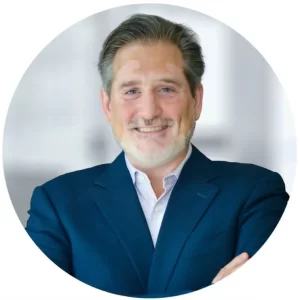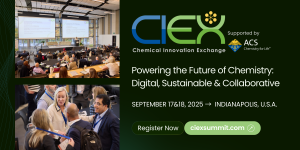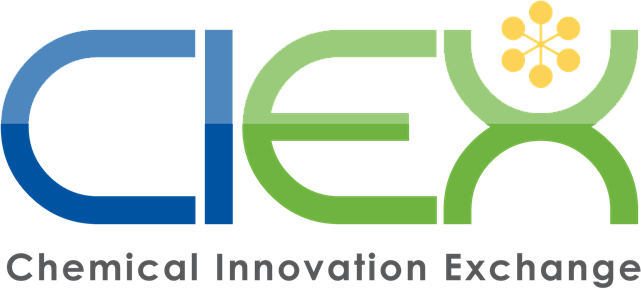Future of the Chemical Industry: Syensqo on AI, Quantum Computing & Robotics

Mike Finelli, Chief Technology & Innovation Officer and Chief North America Officer, Syensqo
Editor’s Note: Mike Finelli is Chief Technology & Innovation Officer and Chief North America Officer at Syensqo. With over 30 years of experience in the chemical industry and more than 15 years in executive leadership roles, he leads strategic innovation across key platforms including battery materials, green hydrogen, thermoplastic composites, and renewable materials. Mike will be speaking at our upcoming CIEX 2025 Summit, taking place on September 17–18, 2025, in Indianapolis, U.S.A. He will be joined by CXOs and VPs of innovation and R&D from 3M, BASF, Sumitomo Chemical, Arkema, DuPont, Evonik, Eastman, and many more. Below is a preview of the key insights Mike will share at the summit.
CIEX: Without giving too much away – what is the core message of your talk and what would you like delegates to remember?
Mike: My keynote address will explore the transformative future of the chemical industry. It will highlight the industry’s exciting potential driven by the convergence of technologies like artificial intelligence (AI), quantum computing and robotics. I hope it will inspire attendees to embrace these technological advancements and seize the opportunity to pioneer the future of the chemical industry.
CIEX: What motivates you to join CIEX this year?
Mike: I’m inspired because everything that makes our lives better starts with chemistry. We create the future. And I am even more excited about our future than ever, thanks to the convergence of amazing technologies such as generative AI, huge advances in quantum computing and how the combination of these two technologies with advanced robotics will change the world. When I think about the next 10 years, I think we will accomplish more than we have done in the last 50 years! That’s why it’s so important to embrace these technologies together and exchange ideas.
CIEX: In what ways have emerging technologies most significantly transformed your R&D process over the past few years – and what impact has this had on speed to market?
Mike: The most impactful emerging technologies are Gen AI and agentic systems. These technologies are allowing us to innovate faster through significantly accelerated R&D processes by enhancing data analysis, predictive modeling and material discovery and reduce the number of experiments needed. Our teams have actually discovered new polymers with unique properties by generating hypothetical polymers from a pool of millions of molecules using AI. This reduced the time usually required for such a discovery by a factor of 3 or more! We are now extending the approach to other material discoveries, targeting other performance criteria. It’s amazing to think of what we can achieve.
CIEX: What are the biggest challenges – and best practices- you´ve seen in scaling innovation from lab to market while staying aligned with business objectives?
Mike:
-
- One of the biggest challenges is ramping up to industrial scale without producing a pilot scale first. The best practice would be to go through the pilot stage but this stage can be very costly and time consuming. The challenge is, how do you skip this step without compromising quality and safety?
- It can be difficult to align with business objectives while managing costs and sustainability. Best practices involve fostering a culture of open innovation, leveraging AI for predictive insights, and maintaining a robust feedback loop between R&D and market needs to ensure alignment with business goals.
CIEX: Open innovation, customer responsiveness, and integrated supply chains are gaining traction. What partnerships or collaborations have been most impactful in driving sustainable growth for your business?
Mike:
- We see all our customers as key partners and innovators. In fact, we have several global Customer Innovation Centers that are hubs of co-creation! Here, we work alongside our customers to develop market-leading and sustainable solutions that meet their unique needs.
- We have numerous key partnerships that advance sustainable solutions. To provide one example, we just announced a strategic partnership with Ardent to supply our high performance materials to help advance their carbon capture and olefin-paraffin separation solutions.
- We are also working closely with our suppliers to reduce our Scope 3 environmental footprint, through our Climate Pledge – a mutual agreement with our top 70 suppliers, who account for 80% of the group’s GHG emissions from raw materials purchased. Our suppliers are committing to play a role in our decarbonization efforts by setting up a roadmap to reduce the carbon footprint of their products and operations.
CIEX: Looking ahead, what do you see as the most critical capability chemical companies must develop to remain competitive in the next decade?
Mike: Chemical companies need to adopt AI and build an AI culture in their companies. This includes leveraging AI for process optimization, accelerated discovery, and customer engagement. This is imperative to remain competitive in an increasingly digital market.
CIEX: Thank you so much, Mike. We look forward to hearing from you more at CIEX 2025!
Powering the Future of Chemical Industry at CIEX 2025 Summit
CIEX is designed for senior-level R&D, innovation, and sustainability professionals from the consumer, industrial, and specialty chemical sectors. Now in its 11th edition, CIEX is focused on creating value by bringing together the right people, fostering synergies, and actively facilitating connections among potential partners.
Join us on September 17 & 18, 2025, in Indianapolis, U.S.A. and get exclusive access to the community powering the future of chemistry — digital, sustainable and collaborative!
Register before 3rd July and save $400 with early-bird pricing!

